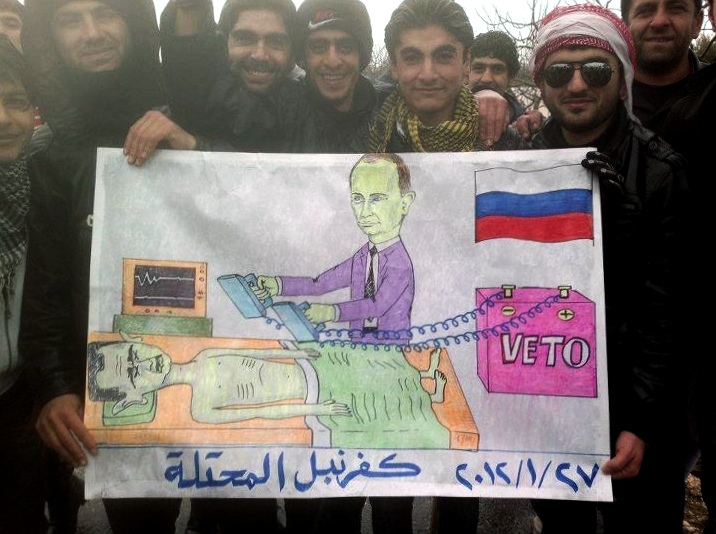Syria: Why Russia Rebuffs the Sheikhs
The diplomatic tug of war over Syria is being presented as a classic UN confrontation between the democracy promoting West and an anti-interventionist Russo-Chinese “veto entente.” This is a mistake.
February 17, 2012 -
Ben Judah
-
Articles and Commentary

putin_syria.jpg
In fact the diplomatic fights over Syria are tri-polar. The West is seeking ways to overthrow Assad and support the Syrian rebels without having to intervene directly. Syria is Russia’s Bahrain and Moscow is trying to protect its only base outside the post-Soviet space and regional bridgehead with Chinese support. Meanwhile Qatar and Saudi Arabia are pushing to overthrow Assad to limit the power of Iran and restore Sunni majority rule to Syria. With Egypt down and Syria out, the Arab League is now essentially a play-thing of the Sheikhs. The West has been enjoying its nascent alliance with Qatar and old friendship with Saudi Arabia during the Arab uprisings. But why is Russia ready to snub the Sheikhs so rudely over Syria?
Qatar is Russia’s gas rival. Moscow is irate that Doha first rebuffed its feelers for a gas OPEC in the mid-2000s and furious that Qatar has been nibbling at Russia’s EU gas market share during the crisis. Russia only has one liquefied natural gas terminal (LNG) and with Qatar positioning itself as a LNG super-power Qatar poses to be a gas menace to Russia. Qatar and Russia have bad-blood over Chechnya. The FSB has its own “war on terror” and Qatar alleges the Russians have shot people in Doha.
The Chechen rebel leader Zelimkhan Yanderbiyev viewed in Moscow as a terrorist wanted dead or alive was gunned down in Doha in 2004. This bad blood reached a peak in December 2011 when Russia scaled down diplomatic relations with Qatar. The Russian Ambassador to Doha was forced to X-Ray a diplomatic bag, going against protocol, resulting in a scuffle that saw the diplomat and two aides hurt. The Ambassador was hospitalized in the attack but Doha refused to apologize. At the UN, Russian diplomats feel they were insulted by the non-democratic Sheikhs. Moscow feels she has no good reason to acquiesce to Qatar’s regional Sunni empire building veiled as democracy promotion. This distrust is not just part of the Putin inner circle but also shared by the “liberal” oligarch Mikhail Prokhorov who is running for President with Putin’s consent.
Russia does not trust Saudi Arabia. Moscow has fought a proxy-war against Riyadh in Afghanistan in the 1980s and elderly Russian diplomats still see Saudi oil market intrusion which drove down prices as an attack that did mortal damage to the Soviet Union. The Saudi educations or links of many insurgents in the North Caucasus mean Russia does not trust Riyadh’s Islam promotion. Estimates range that the two Chechen wars and the insurgency in the region have cost between 80,000 – 175,000 lives in the Russian Federation. “Wahabbi” in Russia is used interchangeably with the word Jihadi. Russian diplomats now feel that the Sheikhs are backing “terror camps” in Turkey to train the Free Syria Army and funding proxy fighters in Syria just like they did in Afghanistan. Adding to this, Moscow has never truly trusted that there are no longer anti-Russian Chechen networks in Turkey like there were in the 1990s. The prospect of new camps horrifies them. It is a mere two-day drive from the Syrian border to the borders of Chechnya. Russian officials view Islamist groups and Jihadist cells through much the same glasses as the Bush administration did the early 2000s – as a single “terrorist international”.
Russia thinks the West is being naïve about Syria and the Sheikhs. Russia has a different intelligence estimate of the balance of forces. Moscow does not believe that Assad will inevitably fall without Western airstrikes. Damascus is viewed as being in control of the army core and big military assets. Instability is viewed as localized and patchy if bloody. An Assad plurality is viewed as being in existence of Alawites, Christians and favourite regime towns. In short, Moscow believes that there is a risk of a Lebanese style war of all against all in an ethnically fractious country and supporting “the last secular regime in the region,” is important. Russia has indicated that it could accept Assad’s departure but not de-Baathification and regime deconstruction in Syria. This is exactly what the Gulf wants to achieve in the mid-term.
Russian officials are also deeply suspicious that the West and the Gulf is aiming to remove an Iranian-ally in the region in order to be better placed to attack without risks of Syria or Hezbollah striking Israel. In the region Russia has a relationship with Iran and Syria, not with the Gulf Arabs and views a Western strike on Iran as against its interest. Russia has a multi-billion dollar contract to build the Iranian atomic reactor in Busher and supplies Iran with weapons and sometimes diplomatic cover in the UN. Russia is not a global power and does not think it has anything to lose by reputational damage with the Sheikhs. Unlike the West, the Kremlin is no longer in the business of promoting norms of a global alliance network. Moscow considers the scenario with Assad out and Iran attacked as the worst-case, where it has the most to lose. And Russia is no hurry to make life easier for Qatar and Saudi Arabia, which, Russia suspects, are pursuing exactly that scenario.
Ben Judah is a Policy Fellow with the European Council on Foreign Relations (ECFR). Previously he was a reporter based in Moscow with Reuters.
This Week in the East is a weekly commentary by research fellows at the European Council on Foreign Relations (ECFR) for New Eastern Europe.


































